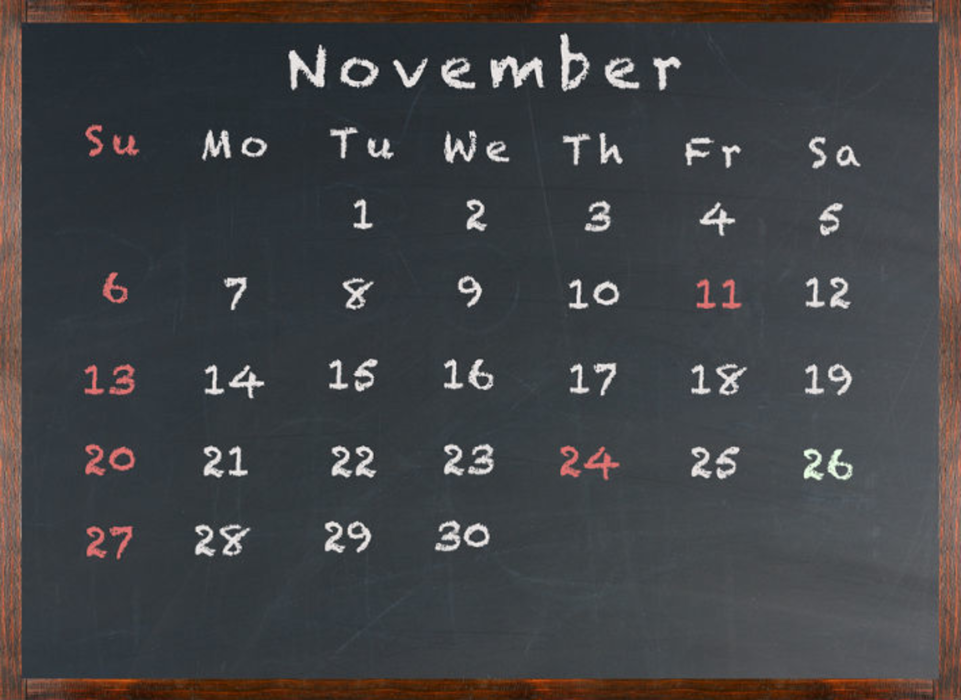Thanksgiving is a special time. It’s a day when consumers not only loosen their belts to make room for extra helpings of turkey and gravy, but they also make room in their inboxes for the additional servings of emails that they receive all weekend long. Although this time may be the busiest season for big brand marketers, a new study by GoDaddy suggests that small businesses’ peak point for engagement has already past.
After analyzing more than one billion emails sent by thousands of GoDaddy small business clients from November 2014 to January 2015, the company discovered that emails sent on November 16—the Monday before Thanksgiving week—experienced open rates that were 14% higher than the average daily open rate over the November to December period. These “Head Start Monday” messages—a term coined by the small business online marketing provider—also produced an average click-through rate that was 23.5% higher than the average daily rate for messages sent during the Thanksgiving to New Year’s time frame.
So, have small business owners already missed their main opportunity to capitalize on customers’ holiday cheer?
“The short answer is yes,” says Steven Aldrich, GoDaddy’s SVP of business applications, “but all is not lost.”
On the contrary, Aldrich says that small business owners still have multiple opportunities to email their customers this holiday season. However, their strategies shouldn’t mirror those of larger brands. Here are email opportunities marketers should take advantage of, as well as the ones they should avoid, for the rest of this holiday season.
Thanksgiving: Avoid.
“Of all of the days that you could decide to send your mail, don’t do it on Thanksgiving,” Aldrich warns. According to GoDaddy’s study, emails sent on Thanksgiving last year had the lowest open rates, compared to messages sent throughout the entire rest of November. Aldrich attributes this dip to the notion that people are often so busy traveling or enjoying family activities that they tend to ignore their emails—especially promotional messages. Instead, he says small businesses should push a message out before Turkey Day or simply wait until the following week.
Black Friday: Avoid.
With so many big brands cramming their way into consumers’ inboxes, it can be difficult for small businesses to grab subscribers’ attention. In fact, GoDaddy’s data shows that emails sent on Black Friday experienced a 19% decrease in open rates compared to those sent on Head Start Monday—even though small businesses sent 30.4% more messages on that Friday. Consequently, Aldrich advises small businesses to take Friday off in terms of email marketing and to start anew the following week. “It will be too hard to break through the clutter,” he says.
Small Business Saturday: Participate.
Although GoDaddy didn’t analyze messages sent on this day for its study, Aldrich says emailing customers on Small Business Saturday can help product-based small businesses drive foot traffic to their stores. A small business could, for example, send an email notifying its customers that the store will be open that Saturday and that it’s offering coffee and cookies to celebrate the occasion, Aldrich says.
Cyber Monday: Participate—if you have a reason to.
According to GoDaddy’s data, there was a “huge surge” of emails sent on Cyber Monday last year; however, the open and click-through rates generated by these messages “paled” in compared to those sent on Head Start Monday.
So, should small businesses opt to email their customers on Cyber Monday? According to Aldrich, it depends on whether they have something meaningful to say.
Cyber Monday is a sales-driven event, he notes, and most small businesses won’t be able to compete with the price drops that big-box retailers can provide. Customer service and local knowledge are where small businesses can give players a run for their money, Aldrich says, and it might be advantageous to wait until later on in the week to flaunt these benefits.
“You’re not tagging onto a sale that the customer is naturally going to jump on from you,” he says. “You’re creating that demand [for service and knowledge]. So, if you, as a small business, are competing on something other than big discounts, you don’t have to send your mail on Cyber Monday, either.”
The rest of the holiday season: Participate
Even if they choose to sit out this Thanksgiving weekend, small businesses can still engage their customers this holiday season. Aldrich advises small businesses to send an email highlighting all of the ways they’ve supported their community, such as through local sponsorships. Other options include sending customers content showing off their expertise in their particular field, or expressing gratitude for their patronage in a holiday thank-you email. The important thing is that small businesses actually email their customers—even if it’s only once a month.
“A monthly cadence is a really good best practice for small businesses,” Aldrich says.
No matter what time of year small business owners email their customers, every email should contain the following, Aldrich says: a short subject line, compelling content, and a clear call-to-action.








